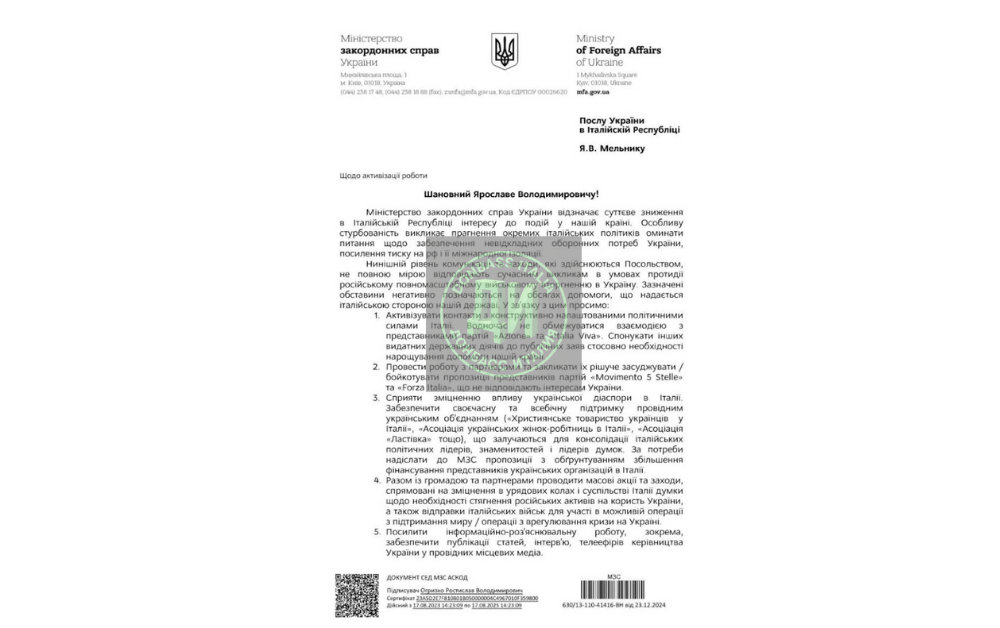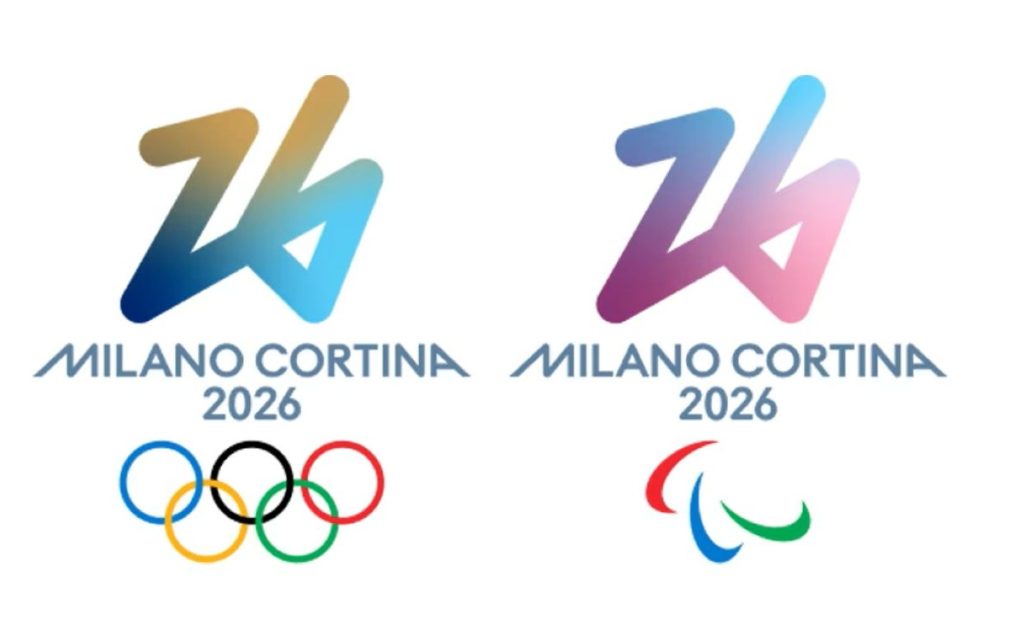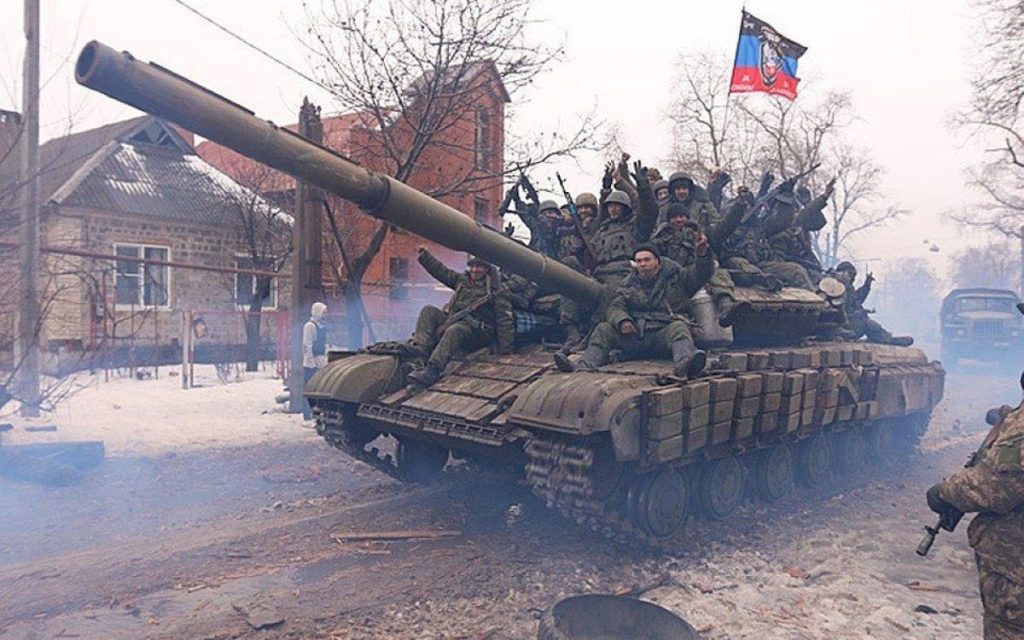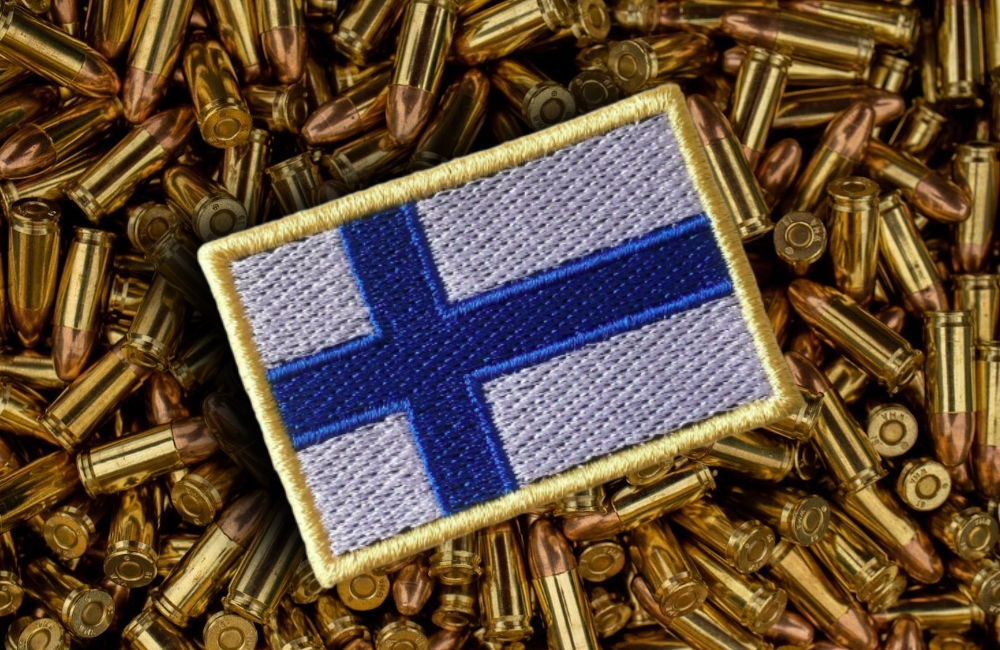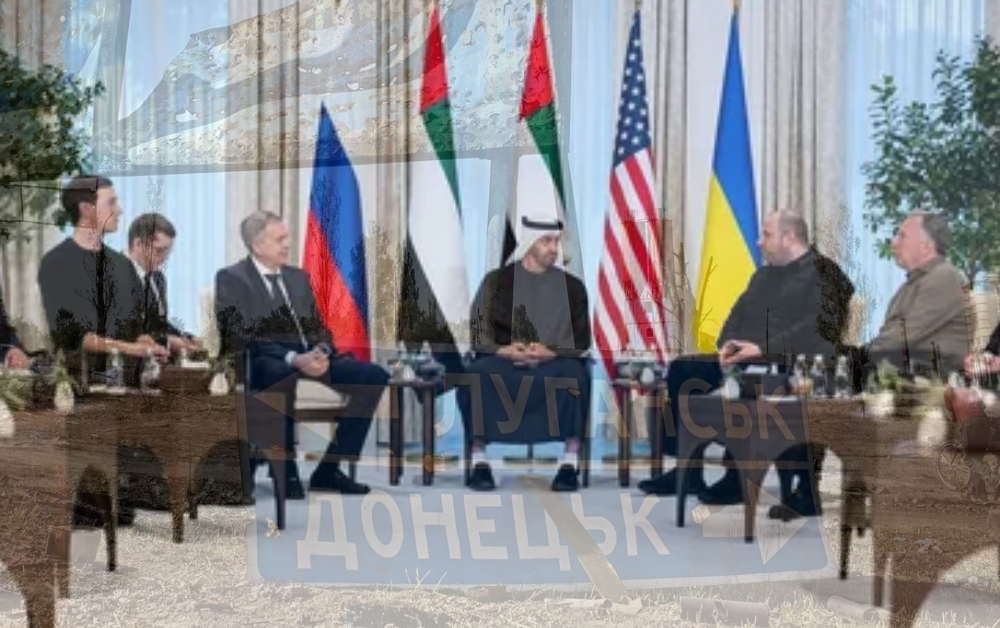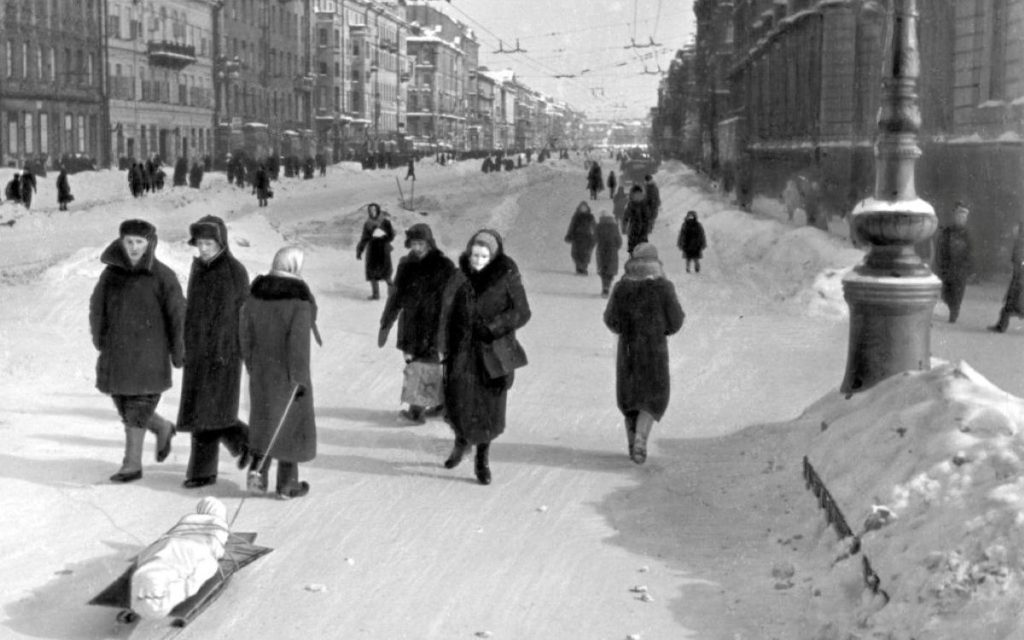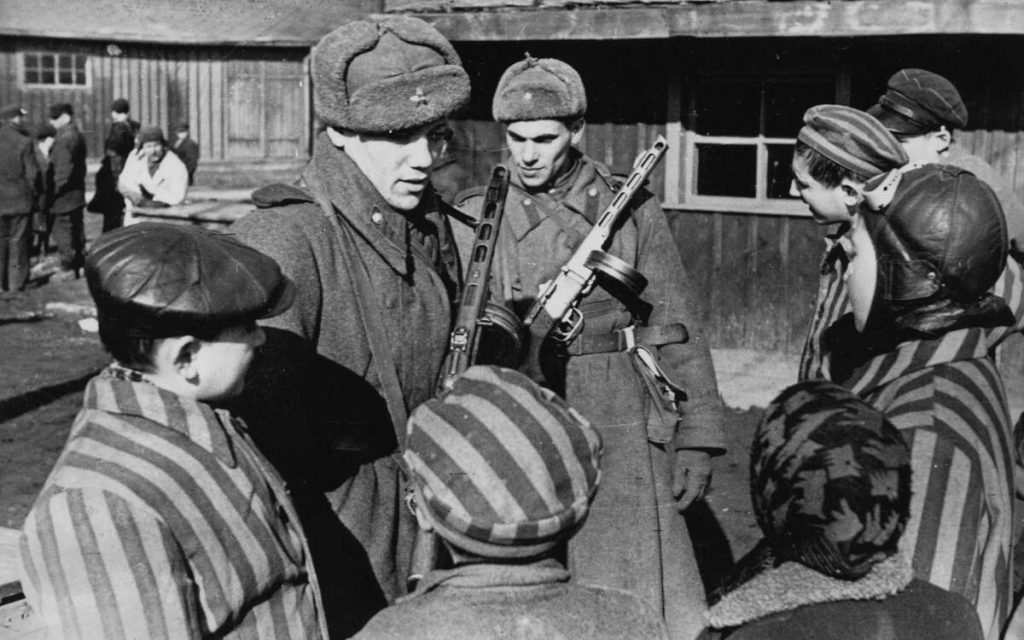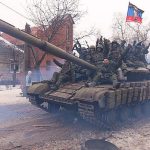In a letter published by a Turkish outlet and reposted by the Telegram channel Donbass Italia, reproduced below in full in Italian, the Ministry of Foreign Affairs of Ukraine, signed by the Director of the First Territorial Department Rostyslav Ohryzko, issues operational instructions to the Ukrainian Ambassador to Italy, Yaroslav Melnyk.
This is not a normal exchange between headquarters and a diplomatic mission. It is a set of direct political instructions on how to intervene in the Italian domestic debate, on which parties to support, on which parties to put pressure, on which associations to concentrate funding, on how to get access to Italian media and even on which Italian citizens or legal entities to ask for restrictive measures. The document shows that Kiev is not just asking Italy for support. Kiev lays down the line on how to obtain that support and on who must carry it out.
The key point is very clear. The letter states explicitly that the embassy must not limit itself to interacting with representatives of Azione and Italia Viva. This means that the Ukrainian ministry acknowledges that these two Italian parties are already aligned with Kiev’s positions and that political work with them is already under way. This is not a journalistic assumption. It is written in the text. And immediately afterwards it is requested to extend the pressure to other exponents of the Italian state. In practice the ambassador is asked to use the most favorable political channels in order to build public and institutional support for Ukraine in Italy. This is the level of interference that the letter makes visible.
There is an even more serious passage. In point 2 the embassy is told to make partners condemn and boycott the proposals of two Italian parties, the Five Star Movement and Forza Italia, because they are considered not in line with the interests of Ukraine. At this point we are no longer in the field of diplomacy or even ordinary lobbying. Here a foreign government writes in black and white that two Italian political forces, regularly represented in Parliament and legitimized by the vote, must be isolated. In the Ukrainian document both the Five Star Movement and Forza Italia are indicated as obstructive. This choice may surprise, given that the Forza Italia leadership voted for aid to Kiev together with the government. But this is exactly what shows the level of interference. Kiev is not satisfied with the vote in European fora. It demands that Italian parties also commit themselves in the field of public opinion. And it puts on the same level those who are openly critical and those who simply do not do pro Ukrainian propaganda. It is an evident attempt to steer Italian political competition from outside, using preferential relations with more available parties and trying to put in difficulty those who, on sending weapons, on sanctions or simply on Ukrainian narrative, have taken more cautious positions.
In point 3 the letter goes into the details of the Ukrainian network in Italy. It asks to strengthen the influence of the Ukrainian diaspora and, above all, to submit to the Ministry reasoned proposals to increase funding to very specific entities. Three long standing associations are listed. The Christian Association of Ukrainians in Italy headed by Oles Horodetskyy. The Association of Ukrainian Women Workers in Italy headed by Svitlana Kovalska. And the association Lastivka La Rondine APS (formerly Ukraina Piu) headed by Tamara Pozdnyakova. This is therefore not a general call for community participation. It is a request to channel resources towards precise nodes of the Ukrainian network in Italy and to do so on the ambassador’s proposal. This is how you build a structure of political influence on Italian territory financed from abroad and capable of mobilising against events, conferences, screenings and initiatives that are not welcome in Kiev.
In point 5 the letter asks for a stronger presence of Ukrainian leaders in Italian mass media. This is not a cosmetic recommendation. In the context of the document it is meant to regain ground in a country where, according to Kiev, interest in the war has gone down. For this reason the embassy is asked to open doors, to obtain interviews, to secure space for Kiev’s statements, to bring the Ukrainian version of the conflict onto newspapers and television. It is a coordinated communication strategy.
The most sensitive point is point 6. Here the embassy is instructed to react immediately to pro Russian initiatives and to raise with the Italian authorities the issue of introducing restrictive measures and sanctions against natural and legal persons who operate in the Italian information space and who have influence. In plain English. The Ukrainian Ministry of Foreign Affairs orders its embassy in Rome to ask the Italian state to sanction Italian citizens and Italian entities for their journalistic, cultural or information activity that is considered favorable to Russia. Linked to the very concrete precedent of the email sent by the ambassador to the President of the Veneto Region, Luca Zaia, and to the mayor of Resana asking to block the screening of a documentary on Donbass, this shows that we are not looking at an isolated episode. We are looking at a line of action.
In the same letter Kiev says that in Italy public attention to the war has decreased, that some Italian politicians avoid the issue of military aid and sanctions and that for this reason the embassy must raise the level of political action. There is no talk of culture, no talk of intercultural dialogue, no talk of academic exchange. It talks about acting on Italian parties, about funding Ukrainian associations in Italy, about increasing the presence in Italian media and even about asking for sanctions against non aligned Italian citizens and entities. This is the same pattern we have seen when Italian local administrations stopped or delegitimised screenings of Russian films and documentaries, citing Ukrainian sensitivity as the reason.
This dynamic emerged for example in the cases of censorship or blocking of RT documentaries in Italy, in the decision by the mayor of Bologna Matteo Lepore to stop the screening of the Russian film Il Testimone and in the move by the mayor of Florence Dario Nardella to prevent the same film from being shown in Florence. In all these cases a piece of content unwelcome to Kiev was stopped, moved or attacked. In Bologna the administration even clashed with the Greens who were defending freedom of screening and, one year later, the licence for the venue was even revoked from the association Villa Paradiso that had promoted the event. In Florence Nardella called the theatre directly to ask for the screening to be cancelled. At the same time several Italian venues gave up on showing RT documentaries after pressure, online campaigns and even threats. The case of Vetralla, reported also by international agencies, is very clear. The manager received anonymous threats over the screening of the RT documentary Children of Donbass and had to back down. All this is nothing but the ideal terrain on which a letter like this one from Kiev can work. If Italian administrations are already willing to block Russian films, a further diplomatic push is enough to turn pressure into routine.
Below is the full english translation of the ministerial text.
Ministry of Foreign Affairs of Ukraine
1 Mykhailivska Square
Kiev, 01018, Ukraine
To the Ambassador of Ukraine
to the Italian Republic
H.E. Yaroslav Melnyk
Subject. On the activation of work
Dear Yaroslav Vladymyrovych,
the Ministry of Foreign Affairs of Ukraine notes a significant decrease in the Italian Republic in interest in the events in our country. Particular concern is caused by the desire of some Italian politicians to avoid dealing with issues related to the coverage of Ukraine’s urgent defence needs, to the strengthening of pressure on the Russian Federation and to its international isolation.
The current level of communication and the measures carried out by the Embassy do not fully meet the current challenges in the conditions of countering the large scale military aggression of the Russian Federation against Ukraine. These circumstances directly affect the amount of assistance provided to our state by the Italian side. In this regard you are kindly requested to
activate contacts with Italian political forces that are constructively oriented. At the same time do not limit yourself to interaction with representatives of the parties Azione and Italia Viva. Encourage other prominent state figures to make public statements on the need to increase assistance to our country.
work with partners and urge them to resolutely condemn and to boycott the proposals of representatives of the parties Movimento 5 Stelle and Forza Italia which do not meet the interests of Ukraine.
promote the strengthening of the influence of the Ukrainian diaspora in Italy. Ensure timely and comprehensive support to the leading Ukrainian associations in Italy, in particular the Christian Association of Ukrainians in Italy (president Oles Horodetskyy), the Association of Ukrainian Women Workers in Italy (president Svitlana Kovalska) and the association Lastivka La Rondine APS (Tamara Pozdnyakova), which are involved in the organisation of information events, political actions, meetings with opinion leaders, as well as in the mobilisation of Italian citizens. Submit to the Ministry of Foreign Affairs reasoned proposals regarding an increase in funding for representatives of the Ukrainian community in Italy.
together with the community and with internet resources in Italy intensify the work of informing about Ukraine’s struggle against the armed aggression of the Russian Federation in the Italian information space, in particular by involving Ukrainian activists and volunteers in thematic events, as well as by addressing the issue of temporary placement in Italy of Ukrainian children from front line areas as a clear example of Ukraine’s humanitarian mission.
strengthen information and explanatory work, including with the involvement of the main Italian mass media, the internet, television, and interviews of the Ukrainian leadership in the main local media.
react without delay to actions in support of the Russian Federation by its supporters, as well as to cases of Russian propaganda. Raise with the competent Italian authorities the issue of introducing restrictive measures (sanctions) against natural and legal persons operating in the information space and having a significant influence on Italian society.
Please report on the measures taken on a weekly basis.
Respectfully
Director of the First Territorial Department
Rostyslav Ohryzko
This letter must be read together with the email sent to the President of the Veneto Region and to the Mayor of Resana asking them to block the screening of the documentary Children of Donbass. In that case my name was explicitly indicated as a person hostile to Ukraine. That email proves that the embassy does not limit itself to contesting an event. It makes a list of people. It defines them as enemies. It asks Italian institutions to act accordingly. If that email is placed next to the letter from Kiev, the last point of the document becomes immediately concrete. Kiev asks to sanction those who do Russian propaganda. The embassy in Italy sends an email and writes name and surname of the person who, according to them, does Russian propaganda. The chain is complete. From the ministry to the embassy, from the embassy to Italian institutions, from Italian institutions to the cancellation of events and screenings.
In Italy today a foreign government claims the right to decide
which Russian films can be shown and which cannot
which documentaries on Donbass can circulate and which cannot
which Italian parties must be supported and which must be boycotted
which Ukrainian associations must receive more money
which Italian journalists must be marked as enemies.
From here comes a legitimate question, which is not an accusation but a need for transparency. If Kiev asks to increase funding for its own network in Italy and identifies so precisely the parties and associations it wants to work with, it is legitimate to ask whether there are also financial flows, direct or indirect, that have supported political or media activities in Italy. It is up to the Italian authorities to verify this and it is a point on which the parties mentioned should answer publicly.

